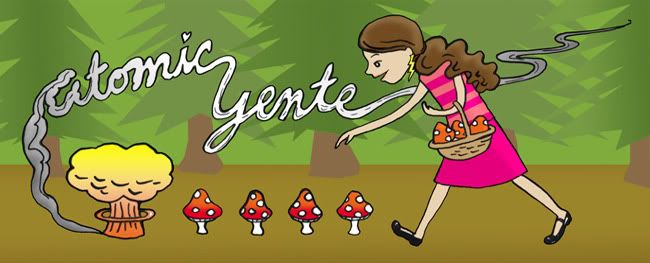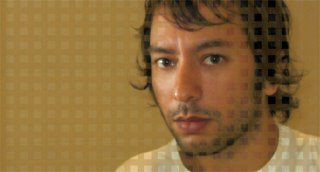ATHENA WALIGORE// PHOTOGRAPHER// THE INTERVIEW

 When I look at Athena's work, I am reminded of the impact of the plastics-and-vinyl-generations on my generation: generation XY.
When I look at Athena's work, I am reminded of the impact of the plastics-and-vinyl-generations on my generation: generation XY.Pears rot in on themselves under the slick sheen of nailpolish. I feel sorry for the pears. They know not what they've done, or what has been done to them, until it's too late. One of them could be named Jean-Benet Pearsy. Another reminds me of an obnoxious multicolor Louis Vuitton bag that got so hungry it had to eat its own insides. Remind you of anybody you know? Beauty can be toxic.
Athena's mammals look like exhibits from a field trip to a natural history museum on The Wonder Years. Kevin Arnold may have well known that the animals were fake. But the first time I saw the photos I thought they were real animals and the magic was in the 60s-style lighting. Hey, it's New York City 2006. You tell me what isn't retro, taxidermied, or behind glass?
ATOMIC YENTE: Why pears?
ATHENA WALIGORE: Pears are a symbol of the female body and sexuality, and they are also frequently used in still life paintings. My inspiration to photograph pears came after I saw a Chardin painting of a pear at the Boston Musuem of Fine Arts.
ATOMIC: Are there any other fruits on the horizon?
ATHENA: I've photographed one peach with some success. I've photographed a bunch of grapes and maybe an apple, those didn't work out so well. I may be doing more, I'm not sure.
ATOMIC: Would you ever consider taking pictures of living, outdoor wildlife?
ATHENA: Yes, there's a project I'm just starting that moves into living wildlife. I'm considering combining living wildlife photographs with the work I'm currently doing. I won't say more, because I don't know how it will go!
ATOMIC: If you were an animal, what would you be and why?
ATHENA: I'd be a bird. I'd want to hang around trees and build nests and most especially fly in groups with my buddies.
ATOMIC: Have you found your community of birds, er, artists in nyc?
ATHENA: Yes, I actually didn't have a community immediately and I recognized it was a real void in my work...so I started a critique group. I invited mostly photographers I didn't know-- now they're the most important part of my community of artists.
ATOMIC: Do you find other artists inspiring, intimidating, annoying, or a mix?
ATHENA: I find most artists interesting and inspiring. It takes a lot less than most people for artists to annoy me. I think for the most part we are all working towards the same thing, so I for the most part feel empathy. It's a hard thing, even if you're just scratching your surface.
ATOMIC: What artists have inspired you?
ATHENA: I've been inspired by painters: Chardin, Cezanne, Monet. Seems funny, but it's really true though. I look at lots of photography; the photographers who have inspired me significantly are Hiroshi Sugimoto and Jan Groover. Both of these photographers inspired a sense of awe and a desire to know the ways in which I'm a totally different photographer than them.
ATOMIC: Okay. Fuck/Marry/Kill? Andy Warhol, Frida Kahlo, and Terry Richardson.
ATHENA: Your set up is perfect, I like this life already. Fuck Frida Kahlo, Marry Andy Warhol, Kill Terry Richardson. Sorry, Terry can you blame me?
ATOMIC: If there was no Andy Warhol do you think there would even be a Terry Richardson?
ATHENA: Well, maybe not, and that' s part of why Terry is more dispensible than Andy Warhol.
ATOMIC: Right. Hey, didn't Andy Warhol only eat strained vegetables? I'm impressed that you could put up with that in wedlock. I suppose your art would be fully funded though.
ATHENA: I like strained vegetables. Is that really ALL he ate though? I don't believe that. Although it would explain the palor. I read his diary, I don't remember any thing about that, although I don't know I would have noticed something like that. It was a few years ago.
ATOMIC: So fyi, I'm the worst photographer ever. The worst! I've heard of the rule of thirds. Any other advice you can give me?
ATHENA: Photograph as a writer, fuck the rule of thirds, look at photographers, and look at your photographs. That's all there is I think. Write about your photographs, I do sometimes, it helps a lot.
ATOMIC: What were you like in High School?
ATHENA: I was in high school for two years.
ATOMIC: GED? Graduated early?
ATHENA: Yeah, we had middle school or junior high until 10th grade, and then I just graduated one year early. My high school was pretty big and I was there at least a year before I realized there were cool kids and cliques. I had my friends and I liked them, and I had my classes and mostly didn't like them. So that was pretty much high school for me! We had a darkroom, and the photography teacher was okay.
ATOMIC: Did you grow up in like Canada, or something weird like that? Heh. Okay. So you've been taking pictures for a while now.
ATHENA: Wisconsin. I used a darkroom in junior high too. I've been interested in it for awhile. I remember when I was about eight, I was photographing at a hill near my house and I met this man who started talking to me about it. He wanted to show me his darkroom. I said well can't you bring it out here for me to see? Of course he couldn't, so I never saw it. I wonder now if he really did understand and was a nice guy and wanted me to see a darkroom, although certainly better safe than sorry.
ATOMIC: Are we better safe than sorry?
ATHENA: I think we can be safe and not sorry. I got to see several darkrooms since that one.
ATOMIC: As a photographer, how do you balance getting a message across with asthetics?
ATHENA: This question of aesthetics and getting a message across is a really hard one, and one I really do think about. Firstly, I make photographs that I need to make and I need to see. I also, of course, really want other people to look at my photographs and get something from them. A reaction from a viewer which would satisfy me is an initial noticing of the beauty or formal elements of one of my photographs, then a questioning of the issues and content in the photograph, then a reconsideration of the photograph which is something like a mixing of those two reactions: that of the brain, and that of the eye or the body. I believe that some kind of beauty is an important, possibly indispensible, part of that process. For me, color is one of the most important things.
ATOMIC: What color are your bedroom walls?
ATHENA: Hehe, my girlfriend just moved in and has ordered that we paint them pink. Right now, though, they are green with yellow trim. I think it matchs the garden, green growth and all. Now I think pink might be a bit nicer.
ATOMIC: If you were a fruit, what would you be?
ATHENA: I am a pear.
For more info on Athena Waligore, visit her site: athenawaligore.com


